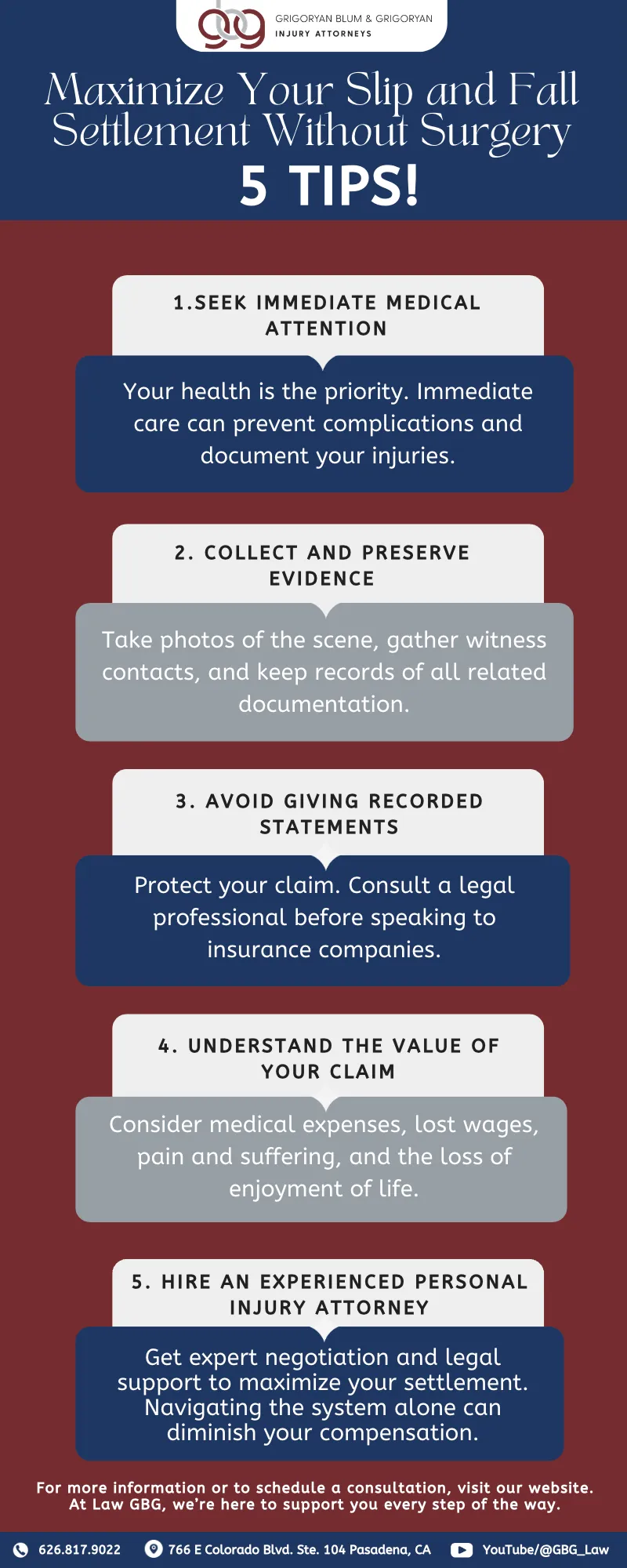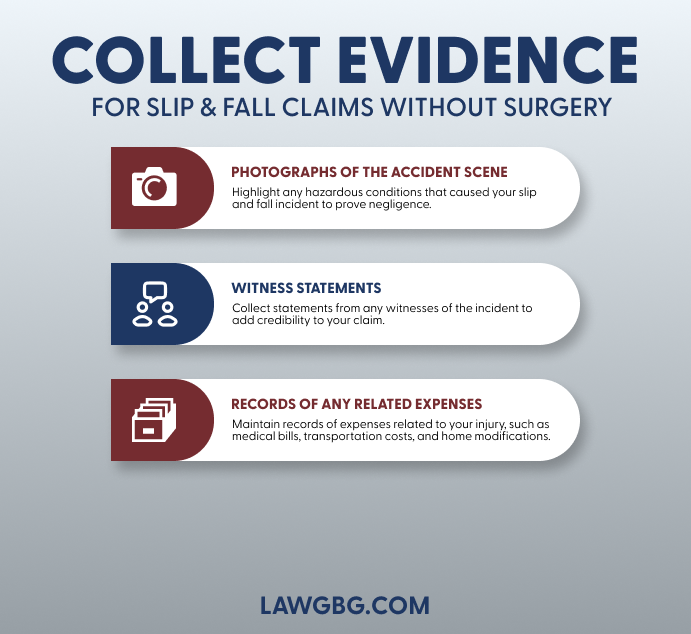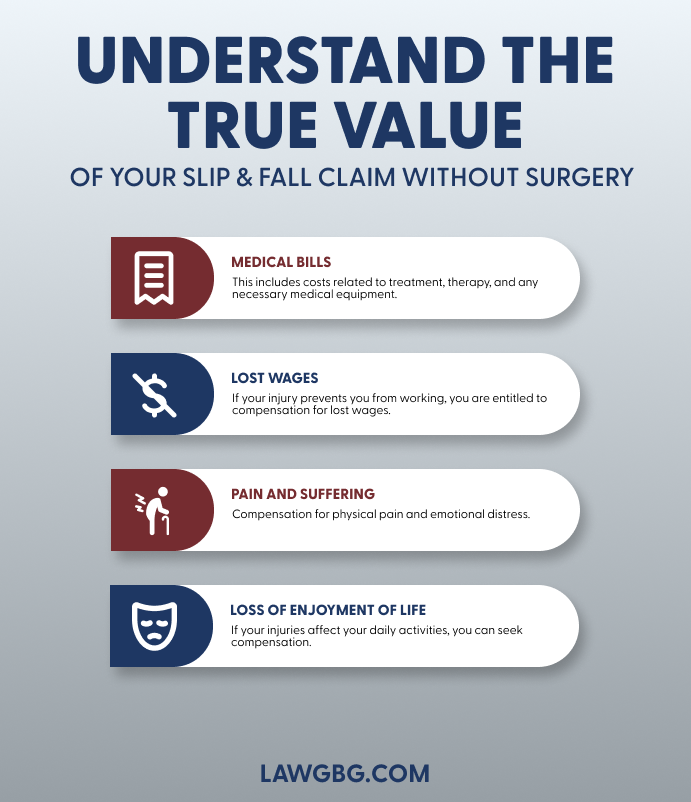Slip and fall incidents can be both unexpected and debilitating. Some injuries may require surgery, but many seek to maximize settlements without going through surgery.
Getting a fair settlement can reduce financial stress and help you move forward without the added strain of extensive medical treatments. We offer five tips to help you get the best slip and fall settlement without surgery so you can receive the compensation you deserve.
The five tips for slip and fall lawsuits are:
Tip 1: Seek Immediate Medical Attention
Tip 2: Collect and Preserve Evidence
Tip 3: Avoid Giving Recorded Statements
Tip 4: Understand the Value of Your Claim
Tip 5: Hire an Experienced Personal Injury Attorney for Slip and Fall Settlements Without Surgery
Let’s dive further into our legal tips!

Tip 1: Seek Immediate Medical Attention
When you experience a slip and fall accident, seeking prompt medical evaluation is crucial. Not only does it ensure your well-being, but it also establishes a critical record of your injuries.
According to California State Law, medical records can serve as crucial evidence to support your claim (California Evidence Code § 1271). Accurate medical records are crucial for slip and fall injury claims. The documents aid in negotiations with insurance providers.
Immediate medical treatment also helps to identify any injuries that may not be immediately apparent. Some conditions, such as brain injury or internal damage, might not manifest symptoms right away. But these injuries can cause permanent disabilities.
Early diagnosis and treatment improve health outcomes. It can strengthen your case with clear medical evidence of the injury’s impact. Early detection and proper care are vital for better health results and stronger legal cases.
Tip 2: Collect and Preserve Evidence
Evidence is the backbone of any personal injury case. To bolster your claim, you must collect and preserve all relevant evidence. This includes:
- Photographs of the accident scene: Capture images of the area where you fell. Highlight any hazardous conditions that caused your accident. Showing visuals of the dangerous conditions that led to your fall can strongly prove negligence.
- Witness statements: Collect statements from anyone who witnessed the incident. Their accounts can corroborate your version of events, adding credibility to your claim.
- Records of any related expenses: Maintain meticulous records of all expenses related to your injury, such as medical bills, transportation costs, and any modifications to your home. This documentation is vital in calculating the economic impact of your injury and supports your claim for economic damages.

To grasp how an injury affects you, monitor daily pain, activity limits, and emotional distress. Detailed documentation provides a holistic view of your injury’s effects. This can be particularly useful in claims for pain and suffering and loss of enjoyment of life.
Tip 3: Avoid Giving Recorded Statements
After your accident, you may be approached by the insurance company representing the property owner. While it might seem routine, giving a recorded statement can be detrimental to your case. Insurance companies often use these statements to minimize their liability.
It is advisable to consult with a legal professional before speaking to the insurance company. Your words can be used against you, potentially reducing your settlement amount.
Insurance adjusters are trained to ask questions that can lead to answers undermining your claim. Even innocent comments can be taken out of context and used to argue that your injuries are not as severe as you claim.
Protect your interests by refraining from recorded statements. Let your personal injury attorney manage communications to avoid potential pitfalls.
Tip 4: Understand the Value of Your Claim
Understanding the true value of your claim is essential in negotiating a fair settlement. Several factors contribute to the valuation of a slip and fall settlement, including:
- Medical bills: Current and future medical expenses play a significant role. This includes costs related to treatment, therapy, and any necessary medical equipment
- Lost wages: If your injury prevents you from working, you are entitled to compensation for lost wages.
- Pain and suffering: Compensation for physical pain and emotional distress.
- Loss of enjoyment of life: If your injuries affect your daily activities, you can seek compensation for the loss of enjoyment of life.

Future medical expenses and long-term impacts are also critical considerations. Some injuries may require ongoing treatment, physical therapy, or medications. Assessing the long-term effects ensures that you do not settle for an amount that fails to cover future costs.
Additionally, understanding how your injury affects your career and earning potential is crucial. A comprehensive evaluation of these factors provides a more accurate claim value.
Do not settle for the first offer you receive!
Insurance companies often propose low initial settlements. They hope that claimants, motivated by financial desperation or a lack of knowledge, will accept these offers. Evaluate how your injuries may affect you in the long run. Negotiate to ensure that you receive the full compensation you deserve.
Tip 5: Hire an Experienced Personal Injury Attorney for Slip and Fall Settlements Without Surgery
One of the most effective ways to maximize your settlement is to hire an experienced personal injury attorney. Legal representation offers several benefits:
- Negotiation expertise: An attorney can negotiate with the insurance company on your behalf, ensuring that your interests are protected.
- Legal knowledge: An attorney understands the nuances of slip and fall cases and can navigate the legal system effectively.
- Maximizing your settlement: With their expertise, an attorney can help you achieve the highest possible settlement amount without the need for surgery.
Hiring a skilled slip and fall attorney is a critical step in securing the compensation you deserve. They will guide you through the process, advocate for your rights, and ensure that all aspects of your claim are thoroughly addressed.
In addition to negotiation, a personal injury lawyer can help you avoid common pitfalls that might undermine your case. They understand the tactics used by insurance companies and can prepare you for potential challenges.
Their experience in similar cases allows them to foresee potential issues. This proactive approach increases your chances of achieving a successful outcome.
Conclusion
Maximizing your slip and fall settlement without surgery is possible by following these key tips:
- Seek immediate medical attention
- Collect and preserve evidence
- Avoid giving recorded statements
- Understand the value of your claim
- Hire an experienced personal injury attorney
Taking these proactive steps can significantly enhance your chances of a favorable outcome.
If you or a loved one has had a slip and fall accident, we can help. Visit our website to learn more. You can also schedule a consultation with one of our experienced slip and fall attorneys.
At Law GBG, we are dedicated to providing comprehensive assistance and ensuring that you receive fair compensation for your injuries.
Remember, you do not have to navigate this challenging process alone. Let our expertise work for you, so you can focus on your recovery and move forward with confidence.
Click here for a complete guide to hiring a pasadena slip and fall lawyer
